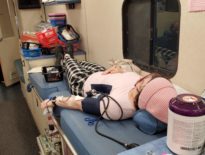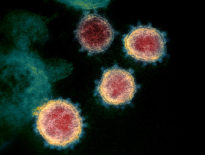
[I’m writing this on Thursday, March 26. Everything in this post might be false in a few days, and conditions might be different in places other than Los Angeles. Keep up to date by checking your local health department website.]
“Time I had some time alone”
— It’s the End of the World as We Know It (And I Feel Fine) by REM
The kerfuffle about coronavirus testing is causing much confusion and anxiety. I attempt below to summarize the situation, at least as it currently stands in Los Angeles.
How can I get tested for the novel coronavirus?
It’s no secret that tests for COVID-19 have been in very short supply. Here are the different ways to get tested, for now.
The City of Los Angeles is offering very limited testing to people in the following groups.
- Those with symptoms who are 65 and older
- Those with symptoms who have underlying chronic health conditions
- Those who are subject to a mandatory 14 day quarantine period due to a confirmed COVID-19 exposure (with more than 7 days of quarantine remaining)
Testing is only available by appointment through the website (link above). There are reports that lines are long. The LA County Dept of Health is also offering tests but only for healthcare workers, first responders, and residents of congregate living settings, like assisted-living facilities or nursing homes.
Doctors’ offices, including ours, have a limited number of tests which are performed by private laboratories. Our tests are run by Quest Diagnostics. (But please read the rest of this article before you contact your doctor asking for one.) There are companies that promise home testing, but these are not yet available. Finally, some large hospitals have started running their own tests. Cedars-Sinai Medical Center just started running COVID-19 tests for their hospitalized patients and will be offering tests for outpatients and community doctors’ offices soon.
How is the test performed?
The test is done with a swab inserted in the nose to the back of the throat. Some tests also use a swab in the mouth to swab the back of the throat.
What are the problems with the test?
One problem with the private labs is the very long backlog, which is causing a long delay before results are available. One test sent from our office took longer than a week to result. Presumably this will improve as testing capacity ramps up, but the details are foggy.
The bigger problem is the test’s low sensitivity. Sensitivity is a precise term in testing jargon. It means the fraction of people who have the disease who will have an abnormal (positive) test result. The sensitivity of the current test is about 70%. That means that three out of ten people who really have COVID-19 will test negative. So, for people who are extremely likely to have COVID-19, for example people with classic symptoms and no other likely diagnosis, a negative test result is more likely to be a false negative than a true negative. Meaning, the test’s low sensitivity makes a negative result untrustworthy. So for cases in which a negative result must be reliable, for example in removing someone from quarantine, multiple sequential tests have to be used.
I feel fine but I’m worried. Can I get tested?
A negative test result won’t help you. You could still be exposed tomorrow or the day after that. And a positive result won’t change much since you should be staying away from people anyway. If you feel fine, assume you have it, stay home, and stay away from others.
I have a cough and a fever. Can I get tested?
Maybe. Call your doctor to report your symptoms. If you’re young and generally healthy, your doctor might simply assume you have COVID. If you can care for yourself at home, a test won’t help improve your care. I have a patient in his 50s who developed a fever and cough about two weeks ago. I saw him in the office. His symptoms were classic for COVID-19. A test would have taken a week and would not have changed his plan. We talked about it. He agreed with me that a test wouldn’t help him. He’s recovering at home and will be well soon. (And he gave me permission to write this.)
So what’s the point? If the test has such terrible characteristics, why did WHO weeks ago recommend widespread testing to member nations? Why do we hear of the success that China and Korea had with widespread testing?
Nations that used testing successfully used it as part of a massive public health effort, not as part of individual patient care. In these nations public health officials went door-to-door and tested tens of thousands of random people so that those who tested positive could be quarantined. Some jurisdictions had specific facilities to quarantine positive cases who didn’t need hospitalization. That allowed them to very quickly separate infected populations from uninfected populations.
We don’t currently have the testing capacity to do that. It’s unclear if we will have that capacity in time to execute the sort of massive public health effort that would help blunt the worst consequences of the pandemic. But I think a bigger barrier is cultural. Would most of us allow health officials to knock on our doors and test us involuntarily? I would, but I’m a doctor. Would we be content to see those who tested positive being housed at the neighborhood high school gym for two weeks against their will? Some nations have cultures of obedience and respect for authority. That’s the sort of culture that allows a massive compulsory intrusion for the public good. We, on the other hand, have a culture of individuality, tolerance of differences, and suspicion of authority. I suspect a massive intrusive compulsory public health effort here would be very challenging. I’m not making any judgments about either sort of culture. I’m just asserting that the reason that we can’t have a large-scale testing effort here isn’t just the lack of tests.
So how are we using tests here?
We’re trying to use tests (a) if the results will affect the care of the individual patient or (b) if the result would make a difference to how people are isolated or quarantined. So hospitalized patients are frequently being tested to confirm the diagnosis, since they may require experimental treatments. Sick people who live with high-risk household contacts are being tested to see if they need to be quarantined elsewhere. Sick people who were recently in a large group are being tested to see if everyone in that group needs to be tracked down. Ultimately this comes down to the judgement of individual physicians, and we’re trying to do the most good with each swab.
What all this about antibody testing?
An antibody test for COVID-19 would be a blood test that would be able to identify if a patient had COVID-19 in the past and recovered. Such a test should be able to identify those who are now immune. Some of the people who are now immune may not know that they were sick, since their symptoms may have been very mild. There is likely a very large group of people who are immune and don’t know it. Companies are gearing up to produce such a test now, but no one knows when it will be widely available.
I think widespread antibody testing would be much easier to implement, and, at this late stage, much more beneficial. (Please note that I’m not an epidemiologist. And if an epidemiologist disagrees with me, then I’m probably wrong.) People who are found to be immune could be allowed to return to work immediately, and healthcare providers who are found to be immune could preferentially be assigned to care for COVID patients. Identifying the immune population and placing them at the forefront of restarting the economy and at the forefront of patient care might be the kind of testing strategy that helps us out of the storm.
Until then, stay inside and stay healthy.
Learn more:
Schedule a COVID-19 Test (City of Los Angeles)
Long lines, big demand: Still-limited LA-area drive-through coronavirus testing inches ahead (Los Angeles Daily News)
Mass testing, alerts and big fines: the strategies used in Asia to slow coronavirus (The Guardian, March 11)
U.S. Communities Struggle to Deal With Coronavirus Testing Backlogs (Wall Street Journal)
Clinician Check List Evaluating Patients Who May Have COVID-19 (Los Angeles County Dept of Health)
COVID-19 testing (Wikipedia, cites an estimate of test sensitivity)

